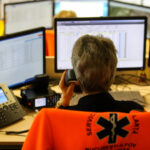Do you ever wonder who’s the person behind our emergency calls to 911? All we know about them is their voice, which is why National Public Safety Telecommunicators Week (NPSTW), observed every second week in April, has been set aside to recognize and celebrate the work of telecommunicators helping to save millions of lives every day. If it weren’t for the telecommunicators flawlessly doing their jobs, billions of lives would have been lost due to untimely assistance. So, throughout this week, we honor and thank those invisible telecommunicators who have continued to serve in this demanding profession.
History of National Public Safety Telecommunicators Week
National Public Safety Telecommunicators Week was founded to honor the telecommunication personnel dedicating their lives to public safety. It was a local initiative that was initially set up in 1981 by Patricia Anderson of Contra Costa County, which later went on to become a nationwide, week-long event.
There’s quite an interesting backstory that marked the establishment of the week. It goes something like this: Sheriff Rainey of the Contra Costa County wanted to treat all his administrative staff (then called secretaries) to lunch one afternoon, to show appreciation for their work, but did not realize that the administration’s lines should never go unanswered during business hours. At that time, it was a practice to forward all administration lines to dispatch after business hours, but the day Sheriff Rainy bought them lunch, the whole administration pushed their calls to dispatch at 11 am and recklessly left the building.
The dispatchers were shocked to receive a higher-than-usual volume of calls. The supervisor called the admin department to find out what the problem was, only to have the call routed back to him because all of them had gone out for a feast! Angered, the supervisor sent a dispatcher to the admin department to see what was going on, who came back to tell the supervisor that the entire building was vacant. Although the staff came back at 1 pm and disconnected the auto-forward feature, a long-time dispatcher, Patricia Anderson walked over to the administration side to give Sheriff Rainey an earful of what the dispatchers had gone through for two hours straight.
An hour later, on the same day, a sheepish Sheriff Rainey walked into the dispatch department with a giant cake decorated with the words “Happy Dispatcher Week,” launching an initiative that has now culminated into National Public Safety Telecommunications Week.
National Public Safety Telecommunicators Week timeline
The work of administrative assistants, also known as secretaries and clerics, is celebrated in April.
Motivated by a tiff between dispatchers and admin, Patricia Anderson and Sheriff Rainey establish the week-long event, now known as National Public Safety Telecommunications Week.
Successfully proclaimed by Congress and signed by President Bill Clinton, National Public Safety Telecommunications Week is designated in the second week of April every year.
NPSTW is formally and permanently recognized and celebrated during the second week of April.
National Public Safety Telecommunicators Week FAQs
What are the standards of conduct for telecommunicators?
According to APCO International, Public Safety Communicators’ Code of Ethics is: “I will keep my private and social life free from all criticism; maintain a calm attitude during times of stress and emergencies; develop self-control and be constantly mindful of the welfare of others, regardless of race, creed, or religion.”
What is a public safety telecommunicator?
They are emergency dispatchers who take information from the public about crimes, threats, fires, acts of terrorism, medical emergencies, and other emergency matters to coordinate and connect with emergency response personnel.
What skills do you need to be a dispatcher?
According to Red River Regional Dispatch Center, the qualities of a good dispatcher include:
- High moral character and integrity.
- Compassion.
- Good judgment.
- High degree of emotional self control.
- Empathy and sensitivity.
- Intelligence.
- Good communication skills.
- Self confidence.
How To Observe National Public Safety Telecommunicators Week
Send a thank-you note
It’s a week-long event of recognition and appreciation. Use your imagination to come up with excellent thank-you notes, cards, posters, letters or gifts to be sent to your local communication centers.
Themed week of events
If you’re part of an agency where dispatchers work, arrange a week full of spirit. Plan dress-up themes and fun activities throughout the week. Make sure this week is spent laughing and enjoying time together, even in-between the endlessly ringing phones.
Celebrate on social media
Thank your emergency call centers and dispatchers on social media using the hashtag #ThankYou911 or #NPSTW to express how grateful you are for all of them around the world. If you’re one of the dispatchers, upload an image of yourself, bask in your week of appreciation, and feel proud serving for public safety.
5 Facts About Emergency Dispatchers That Will Blow Your Mind
They have the most stressful jobs in the U.S.
According to an article in “Business Insider,” emergency call takers scored 98.5 out of 100 in stress tolerance, making their profession one of the most stressful jobs in America.
They work 24/7
Emergency dispatchers do not work from nine to five like most of us — they work while you sleep to help emergency callers who are disoriented, panicked, and unable to think.
They are underpaid
Although they work for 12 hours, seven days a week, their average annual income is only $36,000 despite serving in one of the most important emergency response roles.
Many of them suffer from CISS
Due to the nature of their role, dispatchers often suffer from critical incident stress syndrome (similar to PTSD) characterized by nightmares and severe anxiety, and they have to learn to effectively cope.
They would never hang up on their own
Knowing they are the only qualified voice to give instructions, dispatchers would never hang up the phone or disconnect the line unless and until they know emergency callers have been taken care of by professionals.
Why We Love National Public Safety Telecommunicators Week
They truly care about you
They work for 12 hours, on holidays, birthdays, and every day of the week. They won’t hang up on you. Despite the panic in threatening situations, they do their best to remain calm and keep you calm until help arrives. Public safety telecommunicators or emergency dispatchers give countless hours of their lives in an emotionally taxing job. They care about you more than you’d imagine.
They are severely underpaid
Since their job does not require a college degree or specialization, it’s sad to know that they are severely underpaid for the amount of mental and physical effort they put in every day.
Over 240 million emergency calls are made in the U.S.
The need for emergency dispatchers is truly everlasting and increasing at a steady rate. More than 240 million emergency calls are made to dispatchers every year in the U.S., so the least we can do to recognize their importance is dedicate a week to honoring their contributions.
National Public Safety Telecommunicators Week dates
| Year | Date | Day |
|---|---|---|
| 2024 | April 14–20 | Sunday–Saturday |
| 2025 | April 13–19 | Sunday–Saturday |
| 2026 | April 12–18 | Sunday–Saturday |




































